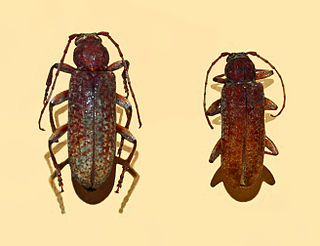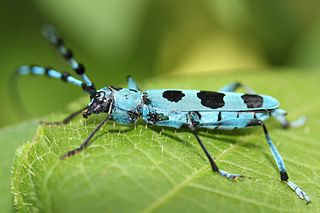
The brown catshark is commonly found in the Pacific Ocean, ranging from the northern Pacific waters off the coast of British Columbia and south to the Baja California peninsula in Mexico. They may live as far south as Ecuador and Peru. Brown catsharks are deep-water sharks that live on the outer continental shelf and the upper slope. They have been known to live at depths ranging from 30 to 650 m and live on the bottom, usually in muddy or sandy areas. The brown catshark, when originally described, was called Catulus brunneus.

Cotyachryson is a genus in the longhorn beetle family Cerambycidae. There are at least three described species in Cotyachryson, found in Chile.

Achrysonini is a tribe of Long-Horned Beetles in the beetle family Cerambycidae. There are more than 20 genera and 50 described species in Achrysonini. They are found mainly in the Americas, but also in Europe, Asia, and Africa.

Abyarachryson is a genus in the longhorn beetle family Cerambycidae. This genus has a single species, Abyarachryson signaticolle, found in Chile.

Achryson is a genus in the longhorn beetle family Cerambycidae. There are about 17 described species in Achryson, found mainly in the Neotropics.
Cerdaia is a genus in the longhorn beetle family Cerambycidae. There are at least two described species in Cerdaia, found in Chile.
Xenocompsa is a genus in the longhorn beetle family Cerambycidae. There are at least three described species in Xenocompsa.

Compsocerini is a tribe of beetles in the subfamily Cerambycinae, containing the following genera:
Dilocerus is a genus in the longhorn beetle family Cerambycidae. There are at least two described species in Dilocerus, found in Bolivia and Argentina.
Curtomerus is a genus of beetles in the family Cerambycidae, containing the following species:

Achryson lineolatum is a species in the longhorned beetle family Cerambycidae. It is known from Bolivia, Chile, Ecuador, Peru, Venezuela, and the Galapagos Islands.

Achryson surinamum is a species of longhorn beetle in the subfamily Cerambycinae. It was described by Carl Linnaeus in his 1767 12th edition of Systema Naturae. It is known from the United States to Chile.

Lautarus is a genus in the longhorn beetle family family Cerambycidae. This genus has a single species, Lautarus concinnus. It is known from southern Argentina and Chile.
Phantazoderus frenatus is a species of longhorn beetle in the Cerambycinae subfamily, and the only species in the genus Phantazoderus. The species was described by Léon Fairmaire and Jean-François Germain in 1864. It is known from Chile and southern Argentina. In flight, Phantazoderus frenatus is easily confused with species of Pyractomena, with which it shares coloration. Its rarity may be due to the density relationship with its model, as a remnant of Batesian mimicry.
Zehra coemeterii is a species in the longhorn beetle family Cerambycidae, found in Chile and Argentina.
Zehra flavosignata is a species in the longhorn beetle family Cerambycidae, found in Chile.
Zehra integra is a species in the longhorn beetle family Cerambycidae, found in Chile and Argentina.
Zehra krahmeri is a species in the longhorn beetle family Cerambycidae, found in Chile.
Zehra livida is a species in the longhorn beetle family Cerambycidae, found in Chile.
Dilocerus marinonii is a species in the longhorn beetle family Cerambycidae. It is found in Argentina and Bolivia.







